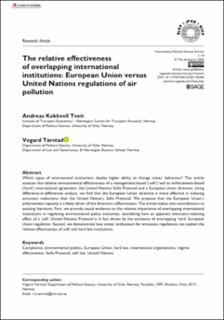The relative effectiveness of overlapping international institutions: European Union versus United Nations regulations of air pollution
Peer reviewed, Journal article
Published version
Permanent lenke
https://hdl.handle.net/11250/3083781Utgivelsesdato
2023Metadata
Vis full innførselSamlinger
- Scientific articles [2181]
Sammendrag
Which types of international institutions display higher ability to change states’ behaviour? This article assesses the relative environmental effectiveness of a management-based (‘soft’) and an enforcement-based (‘hard’) international agreement: the United Nations Sofia Protocol and a European Union directive. Using difference-in-differences analysis, we find that the European Union directive is more effective in inducing emissions reductions than the United Nation’s Sofia Protocol. We propose that the European Union’s enforcement capacity is a likely driver of the directive’s effectiveness. The article makes two contributions to existing literature. First, we provide causal evidence on the relative importance of overlapping international institutions in regulating environmental policy outcomes, elucidating how an apparent emissions-reducing effect of a ‘soft’ United Nations Protocol is in fact driven by the existence of overlapping ‘hard’ European Union regulation. Second, we demonstrate how states’ enthusiasm for emissions regulations can explain the relative effectiveness of soft and hard law institutions. The relative effectiveness of overlapping international institutions: European Union versus United Nations regulations of air pollution

